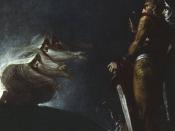In the play "Macbeth" and the novel Lord of the Flies, the prospect of power and the corruptive nature that it has on man affects his relationship to power. Power is defined as, "the ability or capacity to exercise control; authority." This authority ultimately leads to the unveiling of the characters' true temperament. In Shakespeare's "Macbeth" and William Golding's, Lord of the Flies, Macbeth and Jack are used to portray the distressing truth that power corrupts all those who seek it. In "Macbeth", Macbeth's tragic flaw of ambition, as well as moral weakness and selective perception, are gradually revealed through his steady ascension to power and subsequent descent into madness and paranoia. In Lord of the Flies, Jack's subordinate position creates unrest on the island and leads to a disruption in the balance of power. Power and the lack of it, causes the two men to initiate unjust and autocratic administrations that displace the natural order.
Primarily, the essential correlation between the play "Macbeth" and the novel Lord of the Flies is that the aspiration for power corrupts the individuals who decide to pursue it. Early in "Macbeth," the protagonist is greeted by the three witches in the company of Banquo, a fellow thane. At this point in the play, Macbeth is a seen as a valiant leader with Herculean strength and will. The witches salute the arrival of Macbeth with "All hail, Macbeth! Hail to thee, Thane of Glamis! Thane of Cawdor! And king hereafter." Macbeth, confused with the barrage of titles later asks, "With such prophetic greeting. Speak, I charge you." (1.3 50-81) Unfortunately, at this point, the witch's disappear. At this point in the play, it is difficult to see the intent of the witch's, but it is clear that their greeting stirs...


